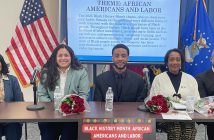During Black History Month in February, we honor the numerous achievements, historical measures and cultural contributions of Black people throughout the world, including in the labor movement.
Black workers helped shape the labor movement from the beginning, forming unions as early as the 1830s.
In just one example, after the Civil War, many Black women did laundry work, which was physically demanding and paid poor wages. In 1881, 20 female laundry workers in Atlanta formed the Washing Society to improve their working conditions and end discrimination. At its height, the group numbered almost 3,000 women. In protest of the unfair treatment they were subjected to, they went on strike. They stood strong in the face of arrests and retaliation from employers and city officials, who had proposed annual fees that would equal months of wages. Seeing the solidarity among the laundry workers and growing support from workers in other industries, city officials ultimately rejected the proposed fees. Even more importantly, the workers prevailed in securing increased wages.
It was an early example of a lesson that remains true today – working people have power when we all stand strong together to fight for justice. Black labor history is full of examples of how workers have used solidarity to fight for positive change.
The labor movement stands with Black workers in the ongoing fight for equity and justice.
CSEA and other labor union members play an important role in this fight by participating in organizations that also fight for working people in the Black community such as the AFL-CIO constituency groups, the Coalition of Black Trade Unionists and the A. Philip Randolph Institute. We must all continue to fight together to ensure justice and equity for all.

